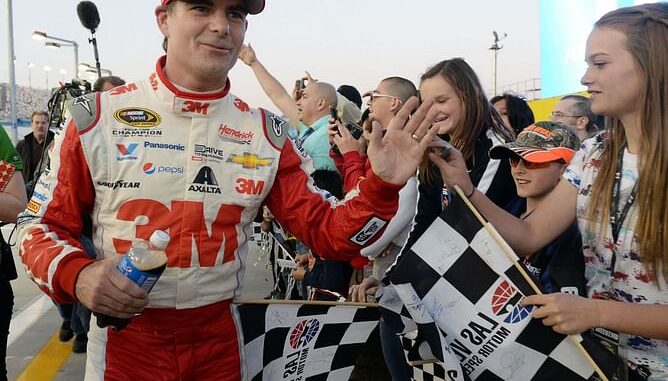
In the fast-paced world of NASCAR, celebrations are as integral to the sport as the races themselves. They mark not just victories, but the culmination of hard work, strategy, and sheer adrenaline. However, a notable incident in NASCAR history stands out as a stark reminder of how regulations can impact these jubilant moments, particularly for one of the sport’s all-time greats, Jeff Gordon.
The Context: A New Era of NASCAR
In 2014, NASCAR introduced a new playoff format that aimed to heighten the drama of the championship chase. This system was designed to create a more competitive and exciting atmosphere, leading to close finishes and unexpected outcomes. While the intent was commendable, this change came with certain rules and protocols that affected how drivers and teams celebrated their victories.
One such incident unfolded after the 2015 race at Martinsville Speedway, where Jeff Gordon, in a particularly emotional moment, secured his first victory of the season. The win was significant for many reasons; it marked a turning point in his career as he prepared for retirement and provided a glimpse of the driver that had dominated the sport for over two decades.
The Celebration Interrupted
Typically, a win at Martinsville is a cause for an exuberant celebration, but the post-race atmosphere was tinged with frustration due to the new protocols. After Gordon crossed the finish line, the usual exuberance was dampened by the new post-race inspection rules. The celebration, which would have typically included a jubilant victory lap, a beer toast, and a flurry of confetti, was overshadowed by the tension surrounding NASCAR’s technical inspection process.
Gordon’s team had to swiftly transition from celebration mode to compliance mode, as officials began scrutinizing the car for any potential violations. The moment that should have been filled with joy and reflection became a hurried process of ensuring everything was in order, dimming the celebratory spirit.
Reactions from Fans and Drivers
Fans and commentators alike expressed disappointment at how the new rules impacted the celebration. Many felt that the focus on strict post-race inspections detracted from the sheer joy of victory—a moment that should be shared with fans and the team alike. Jeff Gordon, who had been a fan favorite and a key figure in promoting the sport, found himself in a situation that many felt undermined the essence of NASCAR’s celebratory culture.
In interviews following the race, Gordon expressed his mixed feelings. While he was thrilled with the win, the restrictions on celebration left a bittersweet taste. “It’s tough to really soak it all in when you have to rush through everything,” he remarked, highlighting the need for a balance between safety and celebration.
The Legacy of the Experiment
In the months following this incident, NASCAR reassessed its approach to post-race procedures. While the intention behind the technical inspections was to maintain fairness and integrity in the sport, the backlash from drivers and fans highlighted the importance of allowing room for celebration. NASCAR officials began to understand that the sport’s heart lies not just in competition, but also in the emotional connections forged during these celebratory moments.
The short-lived experiment ultimately served as a learning experience for NASCAR. It emphasized the need to preserve the sport’s traditions, even while adapting to new challenges. For drivers like Jeff Gordon, who have dedicated their lives to the sport, the celebration is not just a personal victory; it’s a shared experience with fans, teams, and the entire NASCAR community.
Conclusion
Jeff Gordon’s experience following the 2015 Martinsville race is a poignant reminder of the delicate balance NASCAR must strike between regulation and celebration. As the sport continues to evolve, it’s crucial that officials consider the emotional aspects of racing and the importance of allowing drivers to revel in their hard-earned victories. After all, in NASCAR, every checkered flag signifies not just a win, but a moment that deserves to be celebrated—unencumbered and full of joy.
Be the first to comment